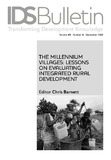Can Immersion Research Add Value in Understanding Integrated Programme Interventions?
| dc.contributor.author | Jupp, Dee | |
| dc.contributor.author | Korboe, David | |
| dc.contributor.author | Dogbe, Tony | |
| dc.date.accessioned | 2018-11-09T10:21:20Z | |
| dc.date.available | 2018-11-09T10:21:20Z | |
| dc.date.issued | 2018-09-30 | |
| dc.identifier.citation | Jupp,D., Korboe, D. and Dogbe, T. (2018) 'Can Immersion Research Add Value in Understanding Integrated Programme Interventions?' in The Millennium Villages: Lessons on Evaluating Integrated Rural Development, IDS Bulletin 49.4, Brighton: IDS | en |
| dc.identifier.uri | https://opendocs.ids.ac.uk/opendocs/handle/20.500.12413/14112 | |
| dc.description.abstract | In the external evaluation of development interventions, beneficiaries are often involved to define priorities, and provide feedback and evaluation. This generally uses ‘invited spaces’ such as facilitated community meetings, focus groups, mobile phone-enabled feedback, and social audits. Where external evaluation must be both independent and separate from the project’s own learning and adaptation processes, this can pose challenges. This article asks whether informal immersion in beneficiaries’ ‘own space’ can provide insights beyond ‘invited spaces’ to enhance our understanding of how people experience development interventions, particularly where these interventions are integrated and complex. The article describes the inclusion of one type of immersion research, the Reality Check Approach (RCA) within the suite of qualitative and quantitative methods used in the longitudinal (external) impact evaluation of the Ghana site under the Millennium Villages Project (MVP). The RCA in this evaluation provided a means to spend concentrated time in beneficiaries’ ‘own space’ without a project (theory-based) evaluation lens. | en |
| dc.description.sponsorship | Department for International Development (DFID) | en |
| dc.language.iso | en | en |
| dc.publisher | Institute of Development Studies | en |
| dc.relation.ispartofseries | IDS Bulletin;49.4 | |
| dc.rights | This is an Open Access article distributed under the terms of the Creative Commons Attribution Non Commercial No Derivatives 4.0 International licence (CC BY-NC-ND), which permits use and distribution in any medium, provided the original authors and source are credited, the work is not used for commercial purposes, and no modifications or adaptations are made. https://creativecommons.org/licenses/by-nc-nd/4.0/legalcode | en |
| dc.rights.uri | http://creativecommons.org/licenses/by-nc-nd/4.0/ | en |
| dc.subject | Rural Development | en |
| dc.title | Can Immersion Research Add Value in Understanding Integrated Programme Interventions? | en |
| dc.type | Article | en |
| dc.rights.holder | Institute of Development Studies | en |
| dc.identifier.team | Rural Futures | en |
| dc.identifier.doi | 10.19088/1968-2018.163 | |
| dcterms.dateAccepted | 2018-09-30 | |
| rioxxterms.funder | Default funder | en |
| rioxxterms.identifier.project | Default project | en |
| rioxxterms.version | VoR | en |
| rioxxterms.funder.project | 9ce4e4dc-26e9-4d78-96e9-15e4dcac0642 | en |
Files in this item
This item appears in the following Collection(s)
Except where otherwise noted, this item's license is described as This is an Open Access article distributed under the terms of the Creative Commons Attribution Non Commercial No Derivatives 4.0 International licence (CC BY-NC-ND), which permits use and distribution in any medium, provided the original authors and source are credited, the work is not used for commercial purposes, and no modifications or adaptations are made. https://creativecommons.org/licenses/by-nc-nd/4.0/legalcode


